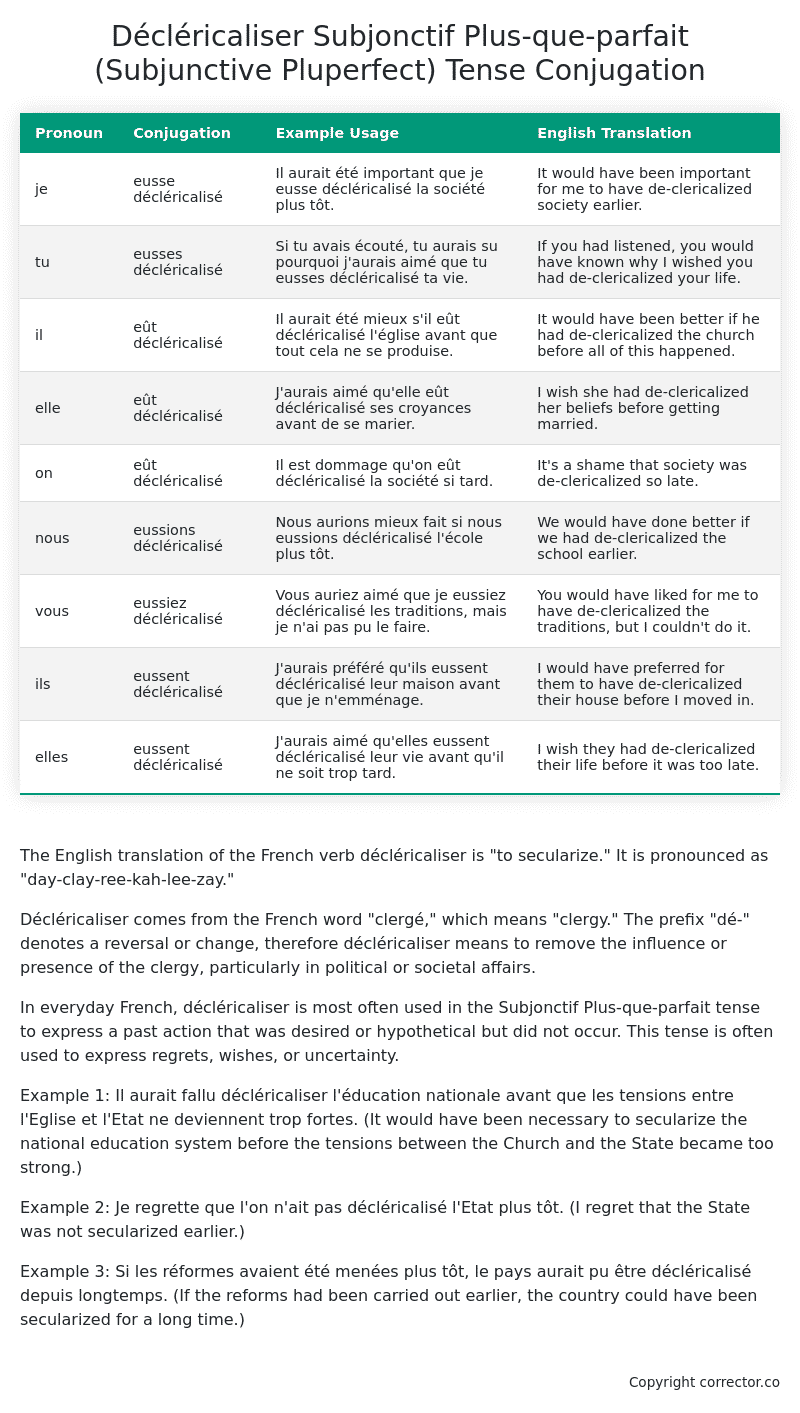Subjonctif Plus-que-parfait (Subjunctive Pluperfect) Tense Conjugation of the French Verb décléricaliser
Introduction to the verb décléricaliser
The English translation of the French verb décléricaliser is “to secularize.” It is pronounced as “day-clay-ree-kah-lee-zay.”
Décléricaliser comes from the French word “clergé,” which means “clergy.” The prefix “dé-” denotes a reversal or change, therefore décléricaliser means to remove the influence or presence of the clergy, particularly in political or societal affairs.
In everyday French, décléricaliser is most often used in the Subjonctif Plus-que-parfait tense to express a past action that was desired or hypothetical but did not occur. This tense is often used to express regrets, wishes, or uncertainty.
Example 1: Il aurait fallu décléricaliser l’éducation nationale avant que les tensions entre l’Eglise et l’Etat ne deviennent trop fortes. (It would have been necessary to secularize the national education system before the tensions between the Church and the State became too strong.)
Example 2: Je regrette que l’on n’ait pas décléricalisé l’Etat plus tôt. (I regret that the State was not secularized earlier.)
Example 3: Si les réformes avaient été menées plus tôt, le pays aurait pu être décléricalisé depuis longtemps. (If the reforms had been carried out earlier, the country could have been secularized for a long time.)
Table of the Subjonctif Plus-que-parfait (Subjunctive Pluperfect) Tense Conjugation of décléricaliser
| Pronoun | Conjugation | Example Usage | English Translation |
|---|---|---|---|
| je | eusse décléricalisé | Il aurait été important que je eusse décléricalisé la société plus tôt. | It would have been important for me to have de-clericalized society earlier. |
| tu | eusses décléricalisé | Si tu avais écouté, tu aurais su pourquoi j’aurais aimé que tu eusses décléricalisé ta vie. | If you had listened, you would have known why I wished you had de-clericalized your life. |
| il | eût décléricalisé | Il aurait été mieux s’il eût décléricalisé l’église avant que tout cela ne se produise. | It would have been better if he had de-clericalized the church before all of this happened. |
| elle | eût décléricalisé | J’aurais aimé qu’elle eût décléricalisé ses croyances avant de se marier. | I wish she had de-clericalized her beliefs before getting married. |
| on | eût décléricalisé | Il est dommage qu’on eût décléricalisé la société si tard. | It’s a shame that society was de-clericalized so late. |
| nous | eussions décléricalisé | Nous aurions mieux fait si nous eussions décléricalisé l’école plus tôt. | We would have done better if we had de-clericalized the school earlier. |
| vous | eussiez décléricalisé | Vous auriez aimé que je eussiez décléricalisé les traditions, mais je n’ai pas pu le faire. | You would have liked for me to have de-clericalized the traditions, but I couldn’t do it. |
| ils | eussent décléricalisé | J’aurais préféré qu’ils eussent décléricalisé leur maison avant que je n’emménage. | I would have preferred for them to have de-clericalized their house before I moved in. |
| elles | eussent décléricalisé | J’aurais aimé qu’elles eussent décléricalisé leur vie avant qu’il ne soit trop tard. | I wish they had de-clericalized their life before it was too late. |
Other Conjugations for Décléricaliser.
Le Present (Present Tense) Conjugation of the French Verb décléricaliser
Imparfait (Imperfect) Tense Conjugation of the French Verb décléricaliser
Passé Simple (Simple Past) Tense Conjugation of the French Verb décléricaliser
Passé Composé (Present Perfect) Tense Conjugation of the French Verb décléricaliser
Futur Simple (Simple Future) Tense Conjugation of the French Verb décléricaliser
Futur Proche (Near Future) Tense Conjugation of the French Verb décléricaliser
Plus-que-parfait (Pluperfect) Tense Conjugation of the French Verb décléricaliser
Passé Antérieur (Past Anterior) Tense Conjugation of the French Verb décléricaliser
Futur Antérieur (Future Anterior) Tense Conjugation of the French Verb décléricaliser
Subjonctif Présent (Subjunctive Present) Tense Conjugation of the French Verb décléricaliser
Subjonctif Passé (Subjunctive Past) Tense Conjugation of the French Verb décléricaliser
Subjonctif Imparfait (Subjunctive Imperfect) Tense Conjugation of the French Verb décléricaliser
Conditionnel Présent (Conditional Present) Tense Conjugation of the French Verb décléricaliser
Conditionnel Passé (Conditional Past) Tense Conjugation of the French Verb décléricaliser
L’impératif Présent (Imperative Present) Tense Conjugation of the French Verb décléricaliser
L’infinitif Présent (Infinitive Present) Tense Conjugation of the French Verb décléricaliser
(this article)
Struggling with French verbs or the language in general? Why not use our free French Grammar Checker – no registration required!
Get a FREE Download Study Sheet of this Conjugation 🔥
Simply right click the image below, click “save image” and get your free reference for the décléricaliser Subjonctif Plus-que-parfait tense conjugation!

Décléricaliser – About the French Subjonctif Plus-que-parfait (Subjunctive Pluperfect) Tense
Formation
Common Everyday Usage Patterns
Hypothetical Situations
Reported Speech
Doubt, Wishes, and Emotions
Interactions with Other Tenses
Present Subjunctive
Imperfect Subjunctive
Conditional
Summary
I hope you enjoyed this article on the verb décléricaliser. Still in a learning mood? Check out another TOTALLY random French verb conjugation!


